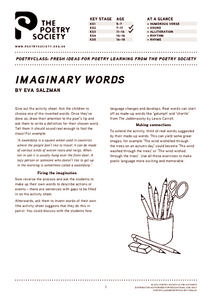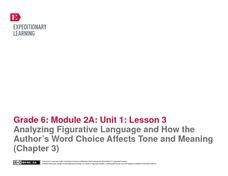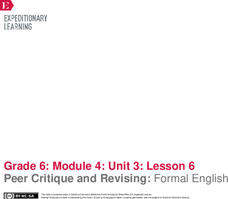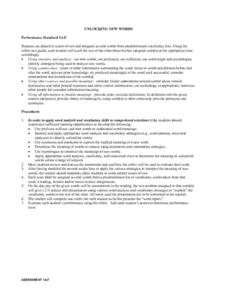Curated OER
English Words from Greek and Roman Names of Gods
Hydra/hygiene, Muse/music. Many English words are built on roots derived from the names of Greek and Roman gods. After examining a list of Greek and Roman gods and the meaning of their names, class members find the root in a list of...
Meadows Center for Preventing Educational Risk, University of Texas at Austin
Lesson 13 - Multisyllabic Word Reading
One- and two-syllable words may flow from the tongue with ease, but longer words, such as department and volcano, feel like tongue twisters. Scaffolded instruction explains how to break words into their individual syllables, and then...
EngageNY
Mid-Unit 1 Assessment: Figurative Language and Word Choice in Bud, Not Buddy (Chapter 5)
Individuals utilize the strategies practiced in the previous lesson to complete a mid-unit assessment on figurative language and how Christopher Paul Curtis uses word choice to create meaning in Bud, Not Buddy.
Curated OER
Spanish-English Cognates in the ELL Classroom: Friends or Foes?
Define the meaning of a cognate and use the concept to help Spanish-speaking ELLs connect their first language to English. Middle schoolers explore Latin roots to find cognates in both languages. They relate the Spanish and English word...
Curated OER
Mythological Word Origins
Review myths and the characters therein, connecting them to vocabulary words in the English language today. Begin by searching online for myths and character names. With at least ten names that are familiar English words, students use...
Curated OER
Make Words
In this making words worksheet, students make as many English words as they can from the letters found in the words bow head whale.
Scholastic
Choose Your Words Wisely (Grades 9-12)
Words, words, words. The function of words in persuasive writing is the focus of a group activity that asks members to analyze how words advertisers use are designed to influence targeted audiences.
Curated OER
Teaching Word Meaning Synonyms, Antonyms, and Analogies
Strengthen and enhance your class's vocabulary with a guided lesson on word relationships. Focusing on synonyms and antonyms, the lesson demonstrates ways to compare and define different words, including word analogies and thesaurus skills.
Syracuse City School District
Greek and Latin Roots, Prefixes, and Suffixes
How can adding a prefix or suffix to a root word create an entirely new word? Study a packet of resources that focuses on Greek and Latin roots, as well as different prefixes and suffixes that learners can use for easy reference.
Poetry Society
Imaginary Words
Oh, what fun! Young logophiles and neologists create a dictionary-sounding definition for imaginary words and try to fool their classmates.
Curated OER
Spanish in English
What do the words alligator, armadillo, and cockroach all have in common? Each one is an English word with Spanish origins. Introduce young etymologists to the joys of discovering word origins with a lesson that asks them to create a...
Meadows Center for Preventing Educational Risk, University of Texas at Austin
Lesson 11 - Affixes with Unchanging Base Words
Adding an affix to a word sometimes changes its meaning, just like magic. Using 11th of 17 lessons in the Word Recognition and Fluency series, readers become vocabulary magicians, learning to form and decode words that contain common...
Curated OER
Word Up!
Study the importance of word choice in informational text. Middle and high schoolers locate unfamiliar words and phrases in newspaper articles of their choosing, and use online word sites to explore the definitions and histories of each....
Curated OER
Using Words as a Way into Rick Riordan's The Lightning Thief
Use the Visual Thesaurus to predict the subject matter of Rick Riordan's book The Lightning Thief. A pre-reading activity encourages middle schoolers to use context clues and word meaning to discover what the book is about. After they...
ReadWriteThink
Word Recognition Strategies Using Nursery Rhymes
As a class, scholars read the poems, Humpty Dumpty, Peter, Peter, Pumpkin Eater, and Jack and Jill, in order to identify words with the same ending sound. Using their rhyming skills, learners brainstorm additional words from word...
EngageNY
Analyzing Figurative Language and How the Author’s Word Choice Affects Tone and Meaning (Chapter 3)
How figurative language affects the tone and meaning in Chapter Three of Christopher Paul Curtis' Bud, Not Buddy is the focus of a series of exercises that ask readers to locate, record, and analyze Curtis' word choices.
EngageNY
Figurative Language and Word Choice: A Closer Look at Bud, Not Buddy (Chapter 2)
The difference between an average and an unforgettable writing can lie in the author's word choice. The figurative language in Chapter 2 of Christopher Paul Curtis's Newbery Medal Winner, Bud, Not Buddy, is the focus of a series of...
EngageNY
Peer Critique and Revising: Formal English
Dear Sir or Madam: What's the difference between formal and informal language? Scholars focus on using formal English and transitions in their position papers. After revising their rough drafts, they engage in the peer editing process...
EngageNY
Examining How Word Choice Contributes to Tone and Meaning: Close Reading of “Wet and Crying”
Scholars participate in a Write-Pair-Share activity while answering questions about the meaning of words in "Wet and Crying." They use their Write-Pair-Share note-catchers to guide their thoughts and then share with the class. After...
Novelinks
The Color of Water: Word Square Instructions
Immaculate, accumulation, dissipation. Vocabulary drawn from chapter 16 of James McBride's memoir, The Color of Water, can prove to be challenge for readers. To help kids understand the meaning of these words and what they add to the...
Curated OER
Word Square: Ender's Game
Ansible. Hegemony. Candor. Readers of Orson Scott Card's Ender's Game create word squares for vocabulary words drawn from this award-winning science fiction novel.
Curated OER
Unlocking New Words: Partner Presentations
Following extensive modeling about how to apply word analysis and vocabulary skills to learn new words, partner teams create brief word presentations to teach new vocabulary to the class. Preselect words from upcoming social studies,...
Curated OER
Breaking News: English Athlete's Hairstyles
Practice vocabulary and speaking skills in this ESL reading comprehension lesson. Middle and high schoolers participate in a number of before, during, and after reading activities based on an article entitled "Footballer Sent Off for...
Curated OER
Phonics Instructional Routine: Read and Write Words with Consonant Digraphs
Use consonant digraphs to introduce learners to word patterns and high frequency words. They observe a chart with the digraphs /sh/, /ch/, /th/, and /wh/. After listening to each of these phonemes, scholars watch as the teacher...
Other popular searches
- Foreign Words in English
- Common English Words
- Basic English Words
- Latin Roots and English Words
- Direction Words in English
- Transportation Words English
- Esl English Language Words
- Esol English Languge Words
- 400 Common English Words
- Foreign Words Used in English
- Spanish Words Used in English
- French Words in English

























